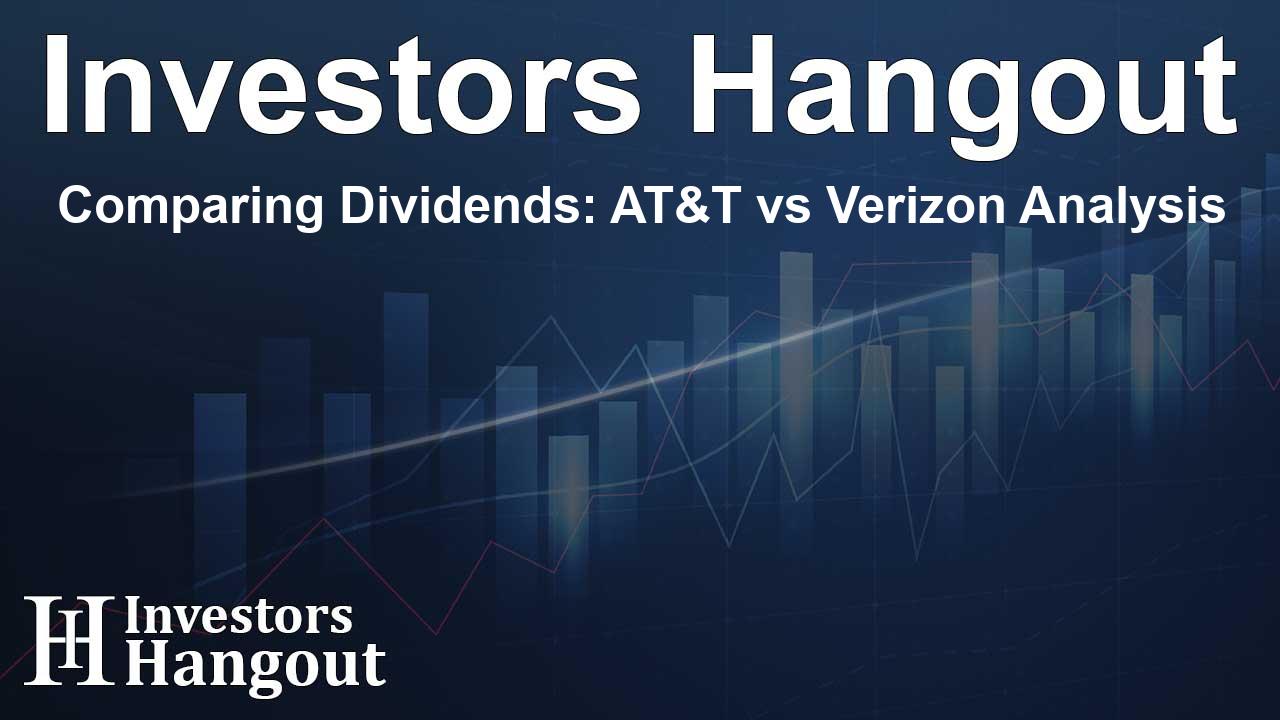Dividend Comparisons Between AT&T and Verizon
AT&T (NYSE: T) and Verizon (NYSE: VZ) have long been regarded as strong contenders for investors seeking reliable income stocks. Both companies began their journey in the landline era and transitioned into wireless and broadband services, continuing to provide dividends to shareholders. Despite their solid foundations, both companies have faced increasing competition, particularly from T-Mobile, and now deal with significant debt levels affecting their dividend strategies.
The Dividend Landscape
Upon initial inspection, many might perceive AT&T as a weaker dividend stock. In 2021, they ended a 35-year history of dividend increases and in 2022, reduced their dividend by nearly 50% to $1.11 per share annually. Nonetheless, this adjustment has led to a current dividend yield of approximately 5.6% based on current share prices.
In contrast, Verizon has built a notable track record of 17 years of annual payout hikes. With its current dividend at $2.66 per share, it offers a more substantial cash return of about 6.4%. While Verizon’s higher yield promises greater immediate returns, it’s crucial to understand the financial strategies at play for both companies.
Financial Obligations and Free Cash Flow
AT&T spends over $8 billion yearly to uphold its dividend, while forecasting free cash flow of $7.7 billion in the first half of 2024 and $11.6 billion in the last two quarters of 2023. This gives a cumulative total of $19.3 billion in free cash flow over the recent 12 months.
Verizon, on the other hand, invests more than $11 billion annually to support its payout, matching AT&T's free cash flow at $19.3 billion as well, with $8.5 billion generated in early 2024 and $10.8 billion in the latter half of 2023. This gives both companies equal leverage when it comes to maintaining their respective dividends.
Challenges Ahead
The major hurdle for both companies lies in managing and ideally reducing their debt obligations. As of the latest financial reports, AT&T reported nearly $131 billion in total debt. While this figure surpasses their stockholders' equity of $119 billion, it’s worth noting that the company managed to lower its debt by $12 billion from the previous year's report.
On the flip side, Verizon’s debt load is heavier, boasting over $149 billion against a mere $98 billion in stockholders' equity. With over $22 billion in debt maturing in the next year, Verizon faces significant refinancing challenges that could pressure its dividend sustainability.
Assessing Dividend Safety
When evaluating the dividend safety of these stocks, AT&T emerges as offering a more secure option. Although its dividend yield is slightly lower, its consistent management of debt gives it a stable footing. The current lack of dividend increases could mean that any potential cuts would have a less severe impact on its stock performance.
Conversely, Verizon's higher debt obligations present a riskier scenario. Despite being able to meet its dividend commitments for now, Verizon's slower progress in debt reduction may lead to increased pressure to maintain payouts if refinancing is necessary.
Should You Invest in AT&T?
If considering investing $1,000 in AT&T, it's critical to weigh the company’s current challenges against its potential for future growth. Presently, income investors may find AT&T to be a more appealing option given its proactive debt management and stable dividend, especially against the backdrop of financial pressure faced by its competitors.
Frequently Asked Questions
What are the current dividend yields for AT&T and Verizon?
As of the latest reports, AT&T has a dividend yield of approximately 5.6%, while Verizon offers a higher yield of around 6.4%.
How much debt does AT&T currently have?
As reported, AT&T holds nearly $131 billion in total debt, which is slightly above its stockholders' equity of $119 billion.
Is Verizon's dividend considered safe?
While Verizon currently meets its dividend obligations, its higher debt levels relative to its equity suggest increased risk for future dividend maintenance.
What should investors consider before investing in AT&T?
Investors should assess AT&T's debt management strategies and the stability of its dividend payments before making an investment decision.
How do AT&T and Verizon compare in terms of financial health?
Both companies generate similar free cash flow, but AT&T has made more progress in reducing its debt compared to Verizon, which has a heavier debt burden and refinancing challenges ahead.
About The Author
Contact Dylan Bailey privately here. Or send an email with ATTN: Dylan Bailey as the subject to contact@investorshangout.com.
About Investors Hangout
Investors Hangout is a leading online stock forum for financial discussion and learning, offering a wide range of free tools and resources. It draws in traders of all levels, who exchange market knowledge, investigate trading tactics, and keep an eye on industry developments in real time. Featuring financial articles, stock message boards, quotes, charts, company profiles, and live news updates. Through cooperative learning and a wealth of informational resources, it helps users from novices creating their first portfolios to experts honing their techniques. Join Investors Hangout today: https://investorshangout.com/
The content of this article is based on factual, publicly available information and does not represent legal, financial, or investment advice. Investors Hangout does not offer financial advice, and the author is not a licensed financial advisor. Consult a qualified advisor before making any financial or investment decisions based on this article. This article should not be considered advice to purchase, sell, or hold any securities or other investments. If any of the material provided here is inaccurate, please contact us for corrections.

